To write correctly, you need to know both how to form verb tenses and when to use them. Verb tenses are formed according to person, number, and tense. They are the key to coherent sentence structure.
Tense, person, and number
Person refers to the subject or object of the verb. Number identifies whether a verb is singular or plural. A few terms will help you to understand how verb tenses are formed.
-
Tense: Refers to the time the action (or state of being) is taking place
-
Number: Refers to whether a verb is singular ( he goes) or plural ( they go)
-
Person: Refers to the person (or thing) that is a subject or object
-
First person: I go (singular). We go (plural). She spoke to me (singular). She spoke to us (singular subject).
-
Second person: Y ou go (singular). You ( all) go (plural). She spoke to you, you ( all) (singular subject).
-
Third person: He, She, It goes (singular). They go (plural). She spoke to him, her, it (singular) . She spoke to them (singular subject, plural object).
Common Verb Tenses
Here are the most commonly used tenses in English:
-
Present: Action going on now
-
Past: Action that is completed
-
Future: Action that has yet to take place
-
Present perfect: Action in past time in relation to present time
-
Past perfect: Action in past time in relation to another past time
-
Future perfect: Action in a future time in relation to another time farther in the future
Definitions of the perfect tenses are difficult to understand without examples. Tables 1 and 6 show the regular verb to walk and the irregular verb to be in each of the tenses for first-, second-, and third-person subjects. Regular verbs, like to walk, form the past tense and the perfect tenses by adding -d or -ed to the present tense. But many English verbs are irregular, forming their past tenses in various ways.
In the future tense, traditionally shall has been used for will in the first-person singular and plural: I shall walk, we shall walk. In modern usage, will has replaced shall almost entirely. Although either is correct, shall can sound overly formal.
